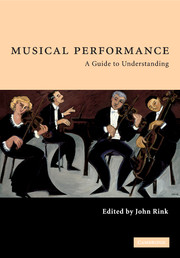15 - The criticism of musical performance
Published online by Cambridge University Press: 05 June 2012
Summary
Considered as a serious form of writing, the concert notice is a relatively new thing. Until quite recently there was a prejudice against it; it was beneath the attention of sophisticated persons. One could write about music theory, about styles and fashions and influence, about new compositions. But there was something degraded and sneaky about criticising concerts and performers. Even a distinguished critic like William J. Henderson declared: ‘We are confronted by the demand of the interpretative artist. Of this any one who places the function of criticism upon a high plane would wish to say very little. The consideration of the performer is the least important office of real criticism.’ The great musical writer Ernest Newman argued in a 1931 newspaper review that repeat performances of well-known works gave the critic nothing to do:
The Promenade Concerts, though rich in delights for the plain music-lover, still present the minimum of pretext to the critic to air his views, for the programmes are mostly given up to works of the most familiar kind. There has been during the past week a Wagner night, a Beethoven night, a Brahms night, and a Tchaikovski night; and as none of these composers has written much lately, there have been no new works for the critic to exercise his infallible judgement upon.
Perhaps because of this prejudice, the story of performance criticism is rather different from that of general music criticism.
- Type
- Chapter
- Information
- Musical PerformanceA Guide to Understanding, pp. 213 - 224Publisher: Cambridge University PressPrint publication year: 2002
References
- 4
- Cited by



